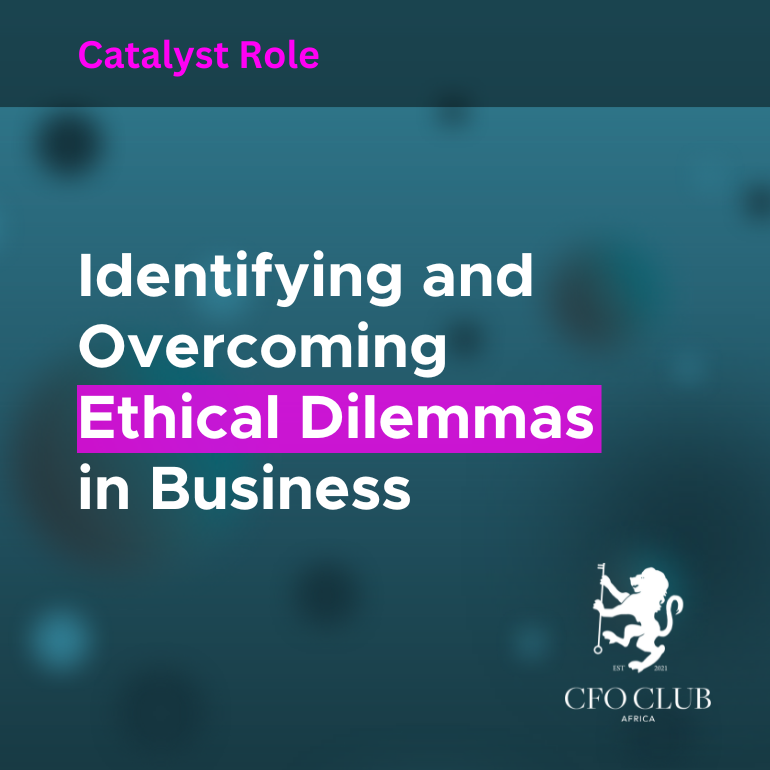Identifying and Overcoming Ethical Dilemmas in Business
In the corporate world, numbers might drive decisions, but values define leadership. As a CFO your influence extends beyond financial reports and budgets. You’re a custodian of trust, navigating a complex business environment where ethical challenges often lurk beneath the surface. These dilemmas might not always come with flashing warning signs, but how you handle them speaks volumes about your leadership and your company’s culture. Let’s explore how to recognise these challenges and address them head-on.
What is an Ethical Dilemma?
At its core, an ethical dilemma is a situation where doing what’s right isn’t clear-cut. It’s when you’re forced to weigh conflicting priorities—profit versus integrity, loyalty versus legality, or personal values versus organisational goals. Ethical dilemmas are not always about right and wrong; they’re about choosing between competing “rights” or mitigating harm in unavoidable situations.
For CFOs, these challenges can come from external pressures like market demands or internal dynamics such as stakeholder expectations. Recognising ethical dilemmas early is the first step toward resolving them effectively.
Common Ethical Dilemmas CFOs Face—and How to Address Them
1. Pressure to Manipulate Financial Results
Example: The board pressures you to inflate revenue projections to secure a loan or attract investors, suggesting it’s “just this once” to meet strategic goals.
What’s at Stake: Misrepresentation might boost short-term results but exposes the company to legal liabilities, loss of investor confidence, and reputational harm.
How to Handle It:
- Stand firm on ethical accounting practices and remind decision-makers of the long-term implications of financial misrepresentation.
- Present alternative solutions, such as reforecasting with realistic assumptions or identifying cost-saving opportunities.
- Escalate concerns to the audit committee or external advisors if internal discussions don’t resolve the issue.
2. Insider Trading Temptations
Example: You learn confidentially about a pending acquisition that will impact stock prices. A colleague hints at leveraging this information to trade shares.
What’s at Stake: Insider trading is not only unethical but also a criminal offense that could lead to fines, jail time, and irreparable reputational damage.
How to Handle It:
- Immediately report the matter to the compliance or legal team.
- Reiterate your obligation to confidentiality and ensure no personal or departmental actions breach insider trading laws.
- Advocate for clear, company-wide insider trading policies to educate employees and prevent future occurrences.
3. Conflict of Interest in Vendor Selection
Example: Your sibling owns a logistics company that submits a bid for your company’s transport services. Their proposal is competitive, but awarding the contract could create suspicion of favoritism.
What’s at Stake: Transparency and fairness in procurement processes are critical to maintaining stakeholder trust.
How to Handle It:
- Disclose your relationship with the procurement team and recuse yourself from the decision-making process.
- Ensure that the evaluation process for vendors is objective, well-documented, and overseen by independent parties.
- Propose additional governance measures, such as third-party audits, to demonstrate transparency.
4. Cutting Costs at the Expense of Ethics
Example: A supplier offers significantly lower rates, but you discover they exploit workers or bypass environmental regulations. Some executives argue that the cost savings justify the partnership.
What’s at Stake: Aligning with unethical suppliers can harm your company’s reputation and expose it to legal and regulatory risks.
How to Handle It:
- Advocate for ethical sourcing by highlighting long-term benefits, such as enhanced brand reputation and compliance with international standards.
- Suggest alternatives, such as renegotiating contracts with current suppliers or investing in sustainable practices that align with company values.
- Develop a supplier code of conduct to ensure partnerships reflect the company’s ethical standards.
5. Whistleblowing on Corruption
Example: You uncover bribery within the sales team to secure contracts with key clients. Reporting the issue may disrupt operations and damage relationships with stakeholders.
What’s at Stake: Turning a blind eye to corruption undermines organisational integrity and could result in severe legal repercussions.
How to Handle It:
- Report the misconduct to the relevant authorities within your organisation, such as the audit or ethics committee.
- Insist on an impartial investigation to determine the scope of the issue.
- Advocate for robust anti-corruption training and policies to prevent recurrence.
How to Handle Ethical Dilemmas Effectively
- Educate Yourself and Your Team
Regularly review laws, industry regulations, and your company’s code of ethics. Ensure your team is equally knowledgeable, as unethical actions often stem from ignorance rather than malice. - Foster an Ethical Culture
Lead by example. Encourage open discussions about ethical concerns and ensure employees feel safe to report misconduct without fear of retaliation. Consider implementing anonymous reporting systems. - Leverage External Resources
In some cases, consulting external auditors, legal advisors, or professional associations can provide clarity and an unbiased perspective. - Balance Stakeholder Expectations
Ethical decisions often require balancing short-term stakeholder demands with long-term organisational values. Communicate transparently about the rationale behind decisions, even if they are unpopular. - Be Prepared to Walk Away
Sometimes, standing firm on ethics may mean losing a deal, client, or even your job. While challenging, maintaining your integrity is far more valuable than any temporary gain.
Why Ethical Leadership Matters
Ethical leadership inspires trust, loyalty, and respect from employees, investors, and customers. In South Africa, where corporate governance frameworks like the King IV Code emphasise ethical leadership, CFOs have a unique responsibility to set the tone. Businesses built on ethical foundations are more resilient, attract better talent, and enjoy stronger reputations in the market.
Final Thoughts
Ethical dilemmas are inevitable in the CFO’s role, but they’re also opportunities to reinforce your values and strengthen your leadership. By addressing these challenges with courage, transparency, and integrity, you safeguard not only your organisation’s reputation but also its long-term success.
In the end, ethical decisions aren’t just about compliance; they’re about building a legacy of trust and inspiring a culture that thrives on doing what’s right—even when it’s difficult.

